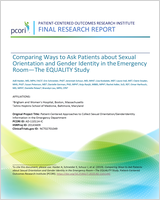|
Privacy
| “a silent transmission of information, so it would maintain a certain level of privacy, thus giving patients the option to consider the questions and … make a sort of thoughtful decision about whether and how to answer them.” —cisgender gay man
“I would probably feel more safer with a computer or something. On the paper I feel like they could just lay the paper down or put it aside; people can actually glance at your information. If it's on a computer, once you leave that computer then it's gone.” —?
“I think the best way to do it is on a computer because it's quiet, you don't have to say it out loud, and it's more confidential.” —African American registrar
| “Because usually at most hospitals with the registrar you have, like, the booths … that provide no privacy. You have people walking behind them. You have people sitting next to you. You have other registrars.” —?
“I wouldn't want to be asked it when I first came in because you would still have to sit in that waiting room, so what if somebody who is maybe homophobic overhears what you are saying? Like, you want this information to go to the people who need to know it and who are going to handle it appropriately. I don't want to be sitting in that waiting room looking over my shoulder thinking, ‘Who just heard that, who just heard that, what do they think of me, am I safe?’” —cisgender bisexual woman
| | |
|
Medical relevance
| | | | “It is not like a doctor coming in and being, like, 'So this is what is wrong with you and what is your sexual identity while we are at it,’ because then it is coming out of total left field and you are, like, 'Wait, why are you asking me this? How does this fit at all in what you were just saying? I don't understand where this came from.’”—?
“[The] doctor would have the most medically relevant reason for asking.” —?
|
|
Normalization
| “I think that's what normalizes it, like, we're just asking everyone, it's standard procedure.” —queer-identified trans man
“I think it's, you know, making sure that that question isn't at all bolded or highlighted where it's visible, or like, it's noticeable that number 8 is the question on orientation or whatnot, you know? I think it's just, as long as it seems like it's just another standard question, like 8, 9, 10, like these are all the questions, like it's just part of it. I don't see it being any different. If anything, I'd be like, 'Oh, how nice, they asked this.’” —cisgender bisexual woman
|
Interviewer: “What is the best way to do it [collect SO and GI]?”
Participant: “I mean, when you checked in, the front end, that way you get it over with. They don't really show emotion anyway when they're asking your personal information.” —African American cisgender lesbian woman “I think probably the registrar asking because then it would just feel like it's just a … this is just standard, this is what the hospital does.” —?
| | |
|
Recognition
| “I feel comfortable knowing if they go to the point of putting this on here [the form] they're okay with it, and I just think that's huge.” —bisexual transgender woman
“if you put it in a form it sort of says we know there are these people in the population and we welcome them.” — cisgender lesbian woman
| | | |
|
Patient–provider relationship
| “I'm just giving it as data rather than presenting this thing about myself to this person who could react one way or another. Like a form can't whisper about it behind your back or treat you differently because of it.” —?
“In my mind, both as a clinician and as a scientist, is, it overcomes a certain barrier of comfort level. If I hand you a sterile form and say please divulge your deepest, darkest information about yourself that you may or may not have shared with everybody else in the world, you may or may not get the truth. People are on their phone, people are, there's a comfort level that, you might overcome that barrier.” —cisgender male physician
| | “There is kind of a middle ground with a nurse that is in a private setting since you are already asking other sensitive information, and if it is in the context of all of these other questions, so it can be very routine … hands down I would want it to come from the nurse … they tend to be a little bit nicer by how they ask things. In my experiences, the nurses tend to just be a lot more sensitive to the fact that you are a person, you are a person with these symptoms rather than the symptoms, rather than the disease, rather than the situation.” —cisgender bisexual woman | |
